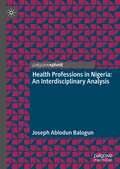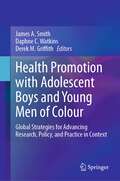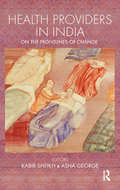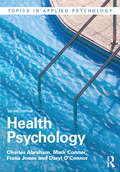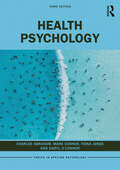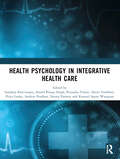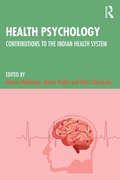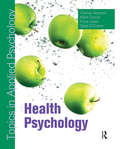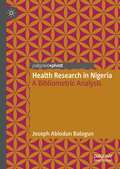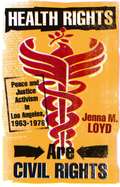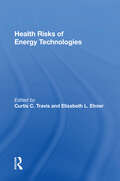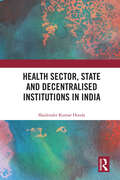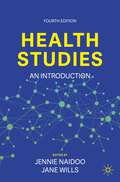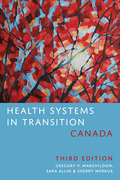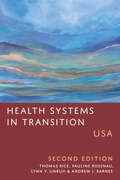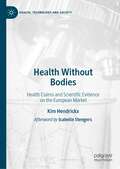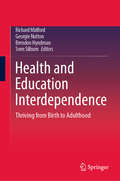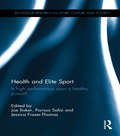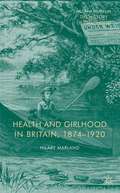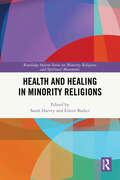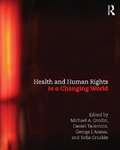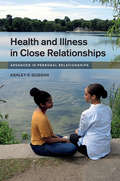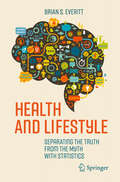- Table View
- List View
Health Professions in Nigeria: An Interdisciplinary Analysis
by Joseph Abiodun BalogunThis book provides a unique assessment of the Nigerian healthcare system's different professions. It begins by examining the fundamentals of health professions to contextualize the issues explored in the book in more detail. It goes on to present the hierarchy of occupations, professionalization, and the evolutionary path and socialization milestones that occupations attempting to attain true professions' status and power transcend. It also analyses the differences between professional autonomy, direct access, and independent practice. The latter parts identify Nigeria's primary healthcare professions and vocational careers and discuss their central roles, each discipline's specialty; including the biography of 35 notable pioneer Nigerian healthcare professionals during the 19th and early 20th centuries. The book concludes by analyzing the causes and adverse impacts of interprofessional conflict and industrial action within the Nigerian healthcare system and proposes the interdisciplinary team concept as a panacea for both conundrums.
Health Promotion with Adolescent Boys and Young Men of Colour: Global Strategies for Advancing Research, Policy, and Practice in Context
by James A. Smith Derek M. Griffith Daphne C. WatkinsThis book highlights novel and pragmatic health promotion efforts being adopted with boys and young men of colour (BYMOC) globally that apply a strengths-based approach. Men's adoption of risky health practices and reluctance to seek help and engage in preventive health behaviours have frequently been used to explain their poorer health outcomes, particularly among adolescent boys and young men, and disproportionately affecting BYMOC. Emerging literature on equity and men's health has conveyed that intersections among age, race, sexuality, socioeconomic status and geography contribute to a complex array of health and social inequities. There is growing evidence to suggest these inequities shape the health practices of BYMOC. Unfortunately, these health and social inequities can have negative lifelong consequences. An increased focus on reducing health inequities has led to a greater focus on health promotion actions that address social and cultural determinants of health.The vulnerabilities that BYMOC face are diverse and are reflected in a range of tailored health promotion interventions. Health promotion approaches that influence structural and systemic inequities experienced by BYMOC have been a prominent feature. In this volume, the editors and contributors purposefully bring together international research and promising practice examples from Australia, the United States, New Zealand, and Canada to celebrate health promotion strategies that help to improve the health and social trajectories of BYMOC. In doing so, the book moves beyond discussing the health inequities faced by this population, to talk about the practical actions to address them in context. Health Promotion with Adolescent Boys and Young Men of Colour brings together diffuse strands of scholarship relating to male health promotion, gender/masculinities and health, equity and men's health, and gender and youth development. The book is a unique and useful resource for practitioners, policy-makers, researchers and students with an interest in health promotion/public health, social work/social policy, education, men's health, youth development, Indigenous studies, and health and social equity.
Health Providers in India: On the Frontlines of Change
by Kabir Sheikh Asha GeorgeThis volume has articles contributed by health researchers, practitioners, policy advocates, programme managers and a journalist, and poems by renowned poet–physician Gieve Patel. Each presents a distinctive view of a particular group of frontline health providers, based on field research or on the authors’ respective experiences of working with or as providers. The health providers addressed in this volume include doctors (working in the public and private sectors), nurses, public health workers, counsellors, traditional practitioners and homecare providers. Different groups of health providers face struggles at diverse frontiers — social, professional and systemic. In the context of reforming health systems, government health workers must constantly negotiate the vagaries of changing working environments and policy vacillations. For traditional and homecare providers, formal health systems and structures often only reject and exclude their contributions. Medical doctors, conversely, face difficult challenges of introspection, as they tread the line between personal gain and public service. The ideas and themes that emerge in this collection not only contribute to the understanding of providers’ roles as actors in the health systems and societies of contemporary India, but re-examines preconceptions about this critical occupational group. This volume advances the case for a deeper appreciation of India’s complex landscape of healthcare provision, and of the potential roles of frontline health providers as central figures in development.
Health Psychology (Topics in Applied Psychology)
by Charles Abraham Mark Conner Fiona Jones Daryl O'ConnorThe new edition of Health Psychology is the perfect introduction to this rapidly developing field. Throughout the book, the psychological processes that shape health-related behaviours, and affect core functions such as the immune and cardiovascular systems, are clearly explained. These relationships provide the foundation for psychological interventions which can change cognition, perception and behaviour, thereby improving health. The book is split into five sections, and builds to provide a comprehensive overview of the field: the biological basis of health and illness stress and health coping resources: social support and individual differences motivation and behaviour relating to patients Extensively revised to include new material on behavioural change, the role of stress, resilience and social support, recovery from work, and the care of people with chronic disease, the book also includes a range of features which highlight key issues, and engage readers in applying what we have learned from research. This is essential reading for any undergraduates studying this exciting field for the first time, and the perfect primer for those embarking on postgraduate study.
Health Psychology (Topics in Applied Psychology)
by Charles Abraham Mark Conner Fiona Jones Daryl O'ConnorNow in its third edition, Health Psychology offers the perfect introduction to this rapidly developing field. Clearly explaining the psychological processes that shape health-related behaviors, and affect core functions such as the immune and cardiovascular systems, it shows how these relationships provide the foundation for psychological interventions which can change cognition, perception and behavior, thereby improving health.Divided into five parts, the book looks at the biological bases of health and illness, stress and health, coping resources, motivation and behaviour, and applied health psychology. The third edition has been revised to highlight:• Current research on the biological processes that underpin stress and illness.• How stress can be best managed at individual, organisational and community levels.• The ways people’s beliefs and attitudes shape motivation and behaviour.• How health promotion can effectively change beliefs and attitudes to promote health behavior change.• The implications of current health psychology research for services.• How health psychology research can improve healthcare practice.• Looking at the roles of practitioner health psychologists.The book is supported by useful in-text features including boxes that highlight key issues, activity boxes and essay questions to engage readers in applying what they have learned from research, and suggestions for further reading to encourage further study.With its clear structure and ability to eloquently link theory to real-world application, this is the perfect primer for both undergraduates studying health psychology for the first time, and those embarking on postgraduate study in this exciting field.
Health Psychology in Integrative Health Care
by Sundeep Katevarapu Anand Pratap Singh Priyanka Tiwari Akriti Varshney Priya Lanka Aankur Pradhan Neeraj Panwar Kumud Sapru WangnueThe 8th International Conference of Indian Academy of Health Psychology (ICIAHP 2023) gathered leading experts, researchers, and professionals to exchange insights and explore innovations in mental and physical well-being. Featuring workshops on trauma release, hypnotherapy basics, mindfulness-based CBT, and suicide prevention, ICIAHP offered a diverse learning experience. Distinguished speakers from national and international universities attended the conference. The conference catered to health psychology professionals, researchers, educators, and scholars. ICIAHP 2023 stood out for its comprehensive program, renowned speakers, and ample networking, providing a platform for holistic learning and collaboration.
Health Psychology: Contributions to the Indian Health System
by Meena Hariharan Meera Padhy Usha ChivukulaThis book provides a holistic understanding of the state of health psychology in the Indian context and the types of psychological and social support and welfare that are offered and required within treatment processes for various illnesses. The book discusses why health care should be the prerogative of both the biomedical profession and health psychologists and how they work together with medical professionals to augment public health. It emphasises the shift from biomedical to biopsychosocial approach in strengthening health care outcomes. The book highlights the substantial contribution of health psychology to the Indian health care system through simple, cost-effective, indigenous, and standardised techniques that worked efficiently in the context of various diseases. It projects the emerging trends and innovative techniques in health psychology in handling challenging health care needs. This book will be of interest to students, teachers, and researchers of psychology, psychiatry, social psychology, sociology, social work and South Asian studies.
Health Psychology: Critical Concepts In Psychology (Topics in Applied Psychology)
by Charles AbrahamTopics in Applied Psychology offers a range of accessible, integrated texts ideal for courses in applied psychology. The books are written by leading figures in their field and provide a comprehensive academic and professional insight into each topic. They incorporate a range of features to bring psychology to life including case histories, research methods, ethical debate and learner activities. Each chapter opens with learning objectives to consolidate key points. A reading list and sample essay questions at the end of chapters enable further independent study. The series also offers an appreciation of multiple perspectives, examines the relationship between psychology and other cognate disciplines and discusses recent developments in each field. Topics in Applied Psychology will provide you with the tools you need to engage with, enjoy and understand your applied psychology discipline, ultimately ensuring confidence and success in exams as well as a comprehensive grounding in the profession. Health Psychology guides the reader through core issues in health psychology research and practice. Each chapter builds on previous ones so that the text provides an overview of the field rather than presenting a compendium of topics. The book discusses mechanisms, models and methods and examines how biological, cognitive, affective and social processes impact on health and illness. It also explores how stress and coping mechanisms affect health behaviours and the psychological determinants of health behaviour. Two chapters focus on how psychological research can be applied to change health-related attitudes and behaviours. Communication between the patient and practitioner is examined as is the role of the health psychologist. The integrated and interactive approach, combined with the comprehensive coverage, make this book the ideal companion for courses in health psychology.Other books in the series include: Clinical Psychology, Criminal Psychology, Educational Psychology, Organizational and Work Psychology and Sport and Exercise Psychology.
Health Research in Nigeria: A Bibliometric Analysis
by Joseph Abiodun BalogunThis book is the first authoritative study of the research output and scientific impact of Nigerian health academics, including those in the diaspora. Around the world, policymakers and academics measure the scientific impact of research at national and international levels using bibliometric measures. Unfortunately, there is limited data on scientists' research productivity and impact in developing countries, particularly in Africa. Therefore, normative bibliometric information from different countries is needed to address the challenges faced by scientists in Africa. This book contributes to filling this research gap. Additionally, the author addresses the controversies surrounding the use of bibliometrics in judging research productivity and offers recommendations to improve research systems.
Health Rights Are Civil Rights: Peace and Justice Activism in Los Angeles, 1963–1978
by Jenna M. LoydHealth Rights Are Civil Rights tells the story of the important place of health in struggles for social change in Los Angeles in the 1960s and 1970s. Jenna M. Loyd describes how Black freedom, antiwar, welfare rights, and women&’s movement activists formed alliances to battle oppressive health systems and structural violence, working to establish the principle that health is a right. For a time—with President Nixon, big business, and organized labor in agreement on national health insurance—even universal health care seemed a real possibility.Health Rights Are Civil Rights documents what many Los Angeles activists recognized: that militarization was in part responsible for the inequalities in American cities. This challenging new reading of suburban white flight explores how racial conflicts transpired across a Southland landscape shaped by defense spending. While the war in Vietnam constrained social spending, the New Right gained strength by seizing on the racialized and gendered politics of urban crisis to resist urban reinvestment and social programs. Recapturing a little-known current of the era&’s activism, Loyd uses an intersectional approach to show why this diverse group of activists believed that democratic health care and ending war making were essential to create cities of freedom, peace, and social justice—a vision that goes unanswered still today.
Health Risks Of Energy Technologies
by Curtis TravisThis text examines occupational, public health, and environmental risks of the coal fuel cycle, the nuclear fuel cycle, and unconventional energy technologies. Includes detailed coverage of the relationship between energy economics and risk analysis, assessing the problems of applying traditional cost-benefit analysis to long-term environmental problems (such as global carbon dioxide levels), questions about the public's perception and acceptance of risk, global risks associated with current and proposed levels of energy production and consumption from all major sources.
Health Sector, State and Decentralised Institutions in India
by Shailender Kumar HoodaThis book describes the transition in Indian healthcare system since independence and contributes to the ongoing debate within development and institutional economics on the approaches towards reform in the public health system. The institutional reform perspective focuses on examining the effective utilisation of allotted resources and improvements in delivery through decentralisation in governance by ensuring higher participation of elected governments and local communities in politics, policymaking and delivery of health services. It discusses the economic (resource) reforms to explain the relevance and expansion of state interventionism along with its influence on the health sector, accountability and allocative efficiency. The author also explores the connections between neoliberal thought and privatisation in health sector, and examines the greater role of insurance-based financing and their implications for health service access and delivery. The book offers ways to address long-standing systemic and structural problems that confront the Indian healthcare system. Based on large-scale surveys and diverse empirical data on the Indian economy, this book will be of great interest to researchers, students and teachers of health economics, governance and institutional economics, political economy, sociology, public policy, regional studies and development studies. This will be useful to policymakers, health economists, social scientists, public health experts and professionals, and government and nongovernment institutions.
Health Studies: An Introduction
by Jane Wills Jennie NaidooThis new edition of Health Studies provides an authoritative and contemporary introduction to the study of health. With chapters including epidemiology, psychology, human and environmental geography, and anthropology, it is the only book to explore in one volume all of the core disciplines that contribute to understanding health. It illustrates how the complexity of health problems such as obesity should be viewed with an interdisciplinary perspective. Each chapter explains the disciplinary approach and then its theoretical and research approaches with examples. A highlight of this 4th edition is a new chapter on sports and exercise science providing another scientific chapter on physiology which is applied and will be of interest to all those thinking of employment in sports or leisure industry.The book is accessible and learner-centered and each chapter features: a connections feature that links the chapters together; learning tasks; questions for reflection and debate; examples to illustrate concepts, methodologies and to explore contemporary issues; a case study on obesity, food and diet.Comprehensive, accessible and written by leading experts in the different fields, this is the introductory text for all students of health studies.
Health Systems in Transition
by Gregory MarchildonThe health care system in Canada is much-discussed in the international sphere, but often overlooked when it comes to its highly decentralized administration and regulation. Health Systems in Transition: Canada provides an objective description and analysis of the public, private, and mixed components that make up health care in Canada today including the federal, provincial, intergovernmental and regional dynamics within the public system. Gregory P. Marchildon's study offers a statistical and visual description of the many facets of Canadian health care financing, administration, and service delivery, along with relevant comparisons to five other countries' systems.This second edition includes a major update on health data and institutions, a new appendix of federal laws concerning select provincial and territorial Medicare legislation, and, for the first time, a comprehensive and searchable index. It also provides a more complete assessment of the Canadian health system based on financial protection, efficiency, equity, user experience, quality of care, and health outcomes.Balancing careful assessment, summary, and illustration, Health Systems in Transition: Canada is a thorough and illuminating look at one of the nation's most complex public policies and associated institutions.
Health Systems in Transition: Canada, Third Edition
by Gregory Marchildon Sherry Merkur Sarah AllinThe health care system in Canada receives a great deal of international attention, but it is subject to considerable critique and debate locally. Health Systems in Transition: Canada provides an insightful and objective analysis of the organization, governance, financing, and delivery of health care as well as comparisons between the Canadian system and others internationally. This book draws on a wide range of empirical studies and statistical data within Canada and across comparable countries to provide a thorough description of the many facets of health care in Canada. Drawing on the most reliable and recent data available, this study reveals the strengths and weakness of Canadian health care. This assessment is based on numerous comparisons of Canada to peer countries (Australia, France, Germany, Netherlands, Sweden, the United Kingdom, and the United States) and among provinces and territories within Canada. It will be of interest to scholars and students in Canada wanting to learn more about the largest and most celebrated public program, and for those outside Canada interested in comparative systems and policy research.
Health Systems in Transition: USA, Second Edition
by Thomas Rice Pauline Rosenau Lynn Y. Unruh Andrew J. BarnesThis analysis of the United States health care system reviews developments in organization and governance, health financing, health care provision, health reforms, and health system performance. The U.S. system has both considerable strengths and notable weaknesses. It has a large and well-trained health workforce, a wide range of high-quality medical specialists as well as secondary and tertiary institutions, a robust health sector research program, and, for selected services, among the best medical outcomes in the world. But it also suffers from incomplete coverage of its citizenry, health expenditure levels per person far exceeding all other countries, poor objective and subjective indicators of quality and outcomes, and an unequal distribution of resources and outcomes across the country and among different population groups. Because of the adoption of the Affordable Care Act in 2010, and subsequent revisions to it, the U.S. is facing a period of enormous change. There is a great need to improve coverage and improve equity, better ensure quality outcomes, and find ways to better control expenditures. Health Systems in Transition: USA provides an in-depth discussion of these issues and a thorough review of the U.S. health care system.
Health Without Bodies: Health Claims and Scientific Evidence on the European Market (Health, Technology and Society)
by Kim HendrickxHealth Without Bodies invites readers on an ethnographic exploration of the boundary between food and medicine. Food-related health claims are governed in the EU as voluntary statements on food labels to help consumers make ‘informed choices’. This poses an interesting problem: when claims refer to health, one can no longer ignore that consumers have bodies. Asking how these claims have become possible as a new kind of truth-statement on the market, this book reveals the contours of a fundamental tension between what is expected from consumers in a liberal market economy, and how food and the body come to trouble those expectations. In doing so, it illuminates why the difference between food and medicine is such a sensitive issue, and why seemingly trivial health claims have been subject to so much debate and political control.
Health and Education Interdependence: Thriving from Birth to Adulthood
by Brendon Hyndman Richard Midford Georgie Nutton Sven SilburnThis book explores the interdependence of health and education, and how optimising this important relationship provides the foundation for achieving improved life outcomes from birth into adulthood. Adopting a multi-disciplinary approach, it draws on bio-medical, epidemiological, educational, psychological and economic evidence to demonstrate the benefits of the reflexive, positive associations between good health and educational attainment over the life course. In this, it offers readers insights into the complex nature of the nexus between health and education and how this relationship influences development. Health and Education Interdependence: Thriving from Birth to Adulthood is essential reading for education and health researchers and policymakers, teachers and public health and health promotion practitioners, as well as students studying in these fields.
Health and Education in Early Childhood
by Arthur J. Reynolds Arthur J. Rolnick Judy A. Temple Arthur J. Reynolds Arthur J. RolnickHealth and Education in Early Childhood presents conceptual issues, research findings, and program and policy implications in promoting well-being in health and education in the first five years of life. Leading researchers in the multidisciplinary fields of early learning and human capital formation explore the themes of the integration of health and education in promoting young children's well-being; the timing of influences on child development; and the focus on multiple levels of strategies to promote healthy early development. Through this, a unique framework is provided to better understand how early childhood health and education predictors and interventions contribute to well-being at individual, family community, and societal levels and to policy development. Key topics addressed in the chapters include nutritional status, parenting, cognitive development and school readiness, conduct problems and antisocial behavior, obesity, and well-being in later childhood and adulthood.
Health and Elite Sport: Is High Performance Sport a Healthy Pursuit? (Routledge Research in Sport, Culture and Society)
by Joe Baker Parissa Safai Jessica Fraser-ThomasHealth and Elite Sport is the first book to critically examine the relationship between participation in high performance sport and health outcomes. Drawing on theory and empirical data from a wide range of disciplines, including sociology, developmental psychology, epidemiology, and physical education, the book explores the benefits and detriments of participation in elite sport for both individuals (athletes, coaches, spectators) and communities. Written by a team of leading international sport researchers, the book examines key issues including: Talent identification and young athletes Abuse in sport Positive youth development through sport Athlete health in periods of transition Health, sport and the family Health in professional sport The Olympics, Paralympics and public health Long term effects of participation in elite sport Highlighting the connections and contradictions between high performance sport and health, the book also discusses the clear and important implications for our socio-cultural, political and developmental understanding of sport. Health and Elite Sport is fascinating and important reading for all students and researchers with an interest in youth sport, sports development, sport policy, sports coaching, exercise and health, physical education, the sociology of sport, or the sociology of health.
Health and Girlhood in Britain, 1874-1920
by Hilary MarlandThis first major study of girls' health in modern Britain explores how debates and advice on healthy girlhood shaped ideas about the lives of young women from the 1870s to the 1920s, as theories concerning the biological limitations of female adolescence were challenged and girls moved into new arenas in the workplace, sport and recreation.
Health and Healing in Minority Religions (Routledge Inform Series on Minority Religions and Spiritual Movements)
by Eileen BarkerThis volume explores the diversity of beliefs and practices around health and healing in minority religions from different perspectives. The contributors include academics from a variety of disciplines as well as members of minority religions. The introductory chapter focuses on the metaphors and meanings that religions use to indicate their understandings of the body and its boundaries and concepts of health and healing. Chapters follow on the concepts of health and healing in the Jehovah’s Witnesses, Christian Science, Panacea Society, Pentecostal Christianity, Paganism, Lubavitcher Hasidim and Daesoon Jinrihoe, amongst others. Other chapters focus on contemporary yoga, the Gisu of Uganda, the psychology of believers in alternative medicine and the French government’s opposition to alternative healing practices. The book will be useful for academics and students of religious studies, especially those interested in minority religions and alternative healing practices.
Health and Human Rights in a Changing World
by George Annas Michael Grodin Daniel Tarantola Sofia GruskinHealth and Human Rights in a Changing World is a comprehensive and contemporary collection of readings and original material examining health and human rights from a global perspective. Editors Grodin, Tarantola, Annas, and Gruskin are well-known for their previous two volumes (published by Routledge) on this increasingly important subject to the global community. The editors have contextualized each of the five sections with foundational essays; each reading concludes with discussion topics, questions, and suggested readings. This book also includes Points of View sections—originally written perspectives by important authors in the field. Section I is a Health and Human Rights Overview that lays out the essential knowledge base and provides the foundation for the following sections. Section II brings in notions of concepts, methods, and governance framing the application of health and human rights, in particular the Human Rights-based Approaches to Health. Section III sheds light on issues of heightened vulnerability and special protection, stressing that the health and human rights record of any nation, any community, is determined by what is being done and not done about those who are most in need. Section IV focuses on addressing system failures where health and human rights issues have been documented, recognized, even at times proclaimed as priorities, and yet insufficiently attended to as a result of State denial, unwillingness, or incapacity. Section V examines the relevance of the health and human rights paradigm to a changing world, underscoring contemporary global challenges and responses. Finally, a Concluding Note brings together the key themes of this set of articles and attempts to project a vision of the future.
Health and Illness in Close Relationships (Advances in Personal Relationships)
by Ashley P. DugganHealth and Illness in Close Relationships provides an integrated theoretical framework for understanding the complexities of health trajectories and relationship processes. It is the first volume to review and synthesize current empirical evidence and associated theoretical constructs from the literature on health and illness in close relationships across the social and behavioral sciences. In doing so, it provides a unique cross-disciplinary understanding of how health and illness redefine relationships. The volume also maps out an explanatory framework of how the pathways and processes of close relationships pose considerations for resilience and flourishing or, on the contrary, for relational and health decline. It will appeal to researchers and students across psychology, communication, and relationship studies, as well as to health professionals who are interested in understanding how health conditions can shape or be shaped by patients' close relationships.
Health and Lifestyle
by Brian S. EverittThe main message of this book is that people should be on their guard against both scare stories about risks to health, and claims for miracle cures of medical conditions. In the 21st century hardly a day passes without another article appearing in the media about a new treatment for a particular disease, new ways of improving our health by changing our lifestyle or new foodstuffs that claim to increase (or decrease) the risk of heart disease, cancer and the like. But how should the general public react to such claims, given that some of the journalists writing them focus on the sensational rather than the mundane and often have no qualms about sacrificing accuracy and honesty for the sake of a good story? Perhaps the wisest initial response is one of healthy scepticism, followed by an attempt to discover more about the details of the studies behind the reports. But most people are not, and have little desire to become experts in health research. By reading this book, however, these non-experts can, with minimal effort, learn enough about the scientific method to differentiate between those health claims, warnings and lifestyle recommendations that have some merit and those that are unproven or simply dishonest. So if you want to know if ginseng can really help with your erectile dysfunction, if breast cancer screening is all that politicians claim it to be, if ECT for depression is really a horror treatment and should be banned, if using a mobile phone can lead to brain tumours and how to properly evaluate the evidence from health and lifestyle related studies, then this is the book for you.
